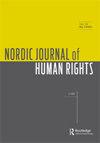The Ambivalent Status of Socio-Economic Rights in Human Rights-Based Approaches to Development
IF 1.2
Q3 POLITICAL SCIENCE
引用次数: 0
Abstract
ABSTRACT Most development objectives overlap with socio-economic rights. It might therefore be assumed that human rights-based approaches to development would imply the strict application of socioeconomic rights principles derived from Article 2(1) of the International Covenant on Economic, Social and Cultural Rights (ICESCR). Twenty years of rights-based development reveal a more ambivalent practice. Accountability is understood primarily in democratic terms associated with participation and empowerment, as opposed to legal terms implying a violations-based framework familiar from the doctrinal development of the ICESCR. Rather than stemming from scepticism about socioeconomic rights as rights, this reflects a discrepancy between the normative and operational levels of rights-based development that in turn follows from a reluctance to inscribe clear legal principles relating to all categories of rights into practice. Socioeconomic rights principles find their greatest application in their programmatic role, integrated loosely as standards in donor, multilateral organisation, and NGO development policies. This is indicative of the reality that socio-economic rights are generally employed not as something to be enforced primarily in a court of law, but as morally serious and politically compelling criteria with which to modify the state's traditional development aspirations of moving numbers of undifferentiated individuals beyond a threshold of service provision.社会经济权利在基于人权的发展方法中的矛盾地位
大多数发展目标都与社会经济权利重叠。因此可以假定,以人权为基础的发展方针意味着严格适用《经济、社会、文化权利国际盟约》(《经济、社会、文化权利国际盟约》)第2(1)条所衍生的社会经济权利原则。二十年来以权利为基础的发展揭示了一种更加矛盾的实践。问责制主要以与参与和赋权相关的民主术语来理解,而不是以法律术语来理解,这意味着与《经济、社会、文化权利国际公约》的理论发展相似的基于违反的框架。这并非源于对社会经济权利作为权利的怀疑,而是反映了基于权利的发展的规范和操作层面之间的差异,这种差异反过来又源于不愿将与所有类别权利有关的明确法律原则纳入实践。社会经济权利原则在其规划作用中得到了最大的应用,作为标准松散地整合在捐助者、多边组织和非政府组织的发展政策中。这表明了这样一个现实,即社会经济权利通常不是作为主要在法庭上执行的东西,而是作为道德上严肃和政治上令人信服的标准来修改国家传统的发展愿望,即将大量无差别的个人转移到服务提供的门槛之外。
本文章由计算机程序翻译,如有差异,请以英文原文为准。
求助全文
约1分钟内获得全文
求助全文
来源期刊

Nordic Journal of Human Rights
POLITICAL SCIENCE-
CiteScore
1.00
自引率
25.00%
发文量
29
期刊介绍:
The Nordic Journal of Human Rights is the Nordic countries’ leading forum for analyses, debate and information about human rights. The Journal’s aim is to provide a cutting-edge forum for international academic critique and analysis in the field of human rights. The Journal takes a broad view of human rights, and wishes to publish high quality and cross-disciplinary analyses and comments on the past, current and future status of human rights for profound collective reflection. It was first issued in 1982 and is published by the Norwegian Centre for Human Rights at the University of Oslo in collaboration with Nordic research centres for human rights.
 求助内容:
求助内容: 应助结果提醒方式:
应助结果提醒方式:


